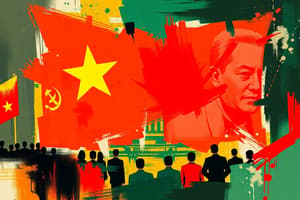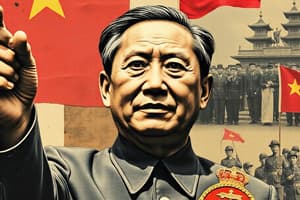Podcast
Questions and Answers
What strategic objective did the French aim to achieve by establishing a fortified base at Dien Bien Phu?
What strategic objective did the French aim to achieve by establishing a fortified base at Dien Bien Phu?
- To cut off Viet Minh supply lines into Laos and provoke a conventional battle. (correct)
- To establish a permanent colonial presence in Northwestern Vietnam.
- To directly engage and defeat the main forces of the Chinese army.
- To secure a strategic alliance with the local tribes against the Viet Minh.
Which of the following best describes the United States' formal involvement in the Geneva Accords of 1954?
Which of the following best describes the United States' formal involvement in the Geneva Accords of 1954?
- The U.S. acknowledged the Accords but declined to sign, promising not to undermine them. (correct)
- The U.S. actively undermined the Accords through covert operations.
- The U.S. fully supported and enforced the elections scheduled by the Accords.
- The U.S. formally signed the Accords, committing to uphold its terms.
How did the outcome at Dien Bien Phu MOST directly influence the subsequent Geneva Conference?
How did the outcome at Dien Bien Phu MOST directly influence the subsequent Geneva Conference?
- It caused the US to immediately deploy troops in South Vietnam to stop the spread of communism
- It led to the immediate withdrawal of all foreign powers from Indochina.
- It resulted in a stronger French resolve to maintain colonial control.
- It demonstrated the effectiveness of communist guerilla warfare, leading to negotiations and the partitioning of Vietnam. (correct)
What was a key provision of the Geneva Accords regarding the political future of Vietnam?
What was a key provision of the Geneva Accords regarding the political future of Vietnam?
What impact did the defeat at Dien Bien Phu have on French colonial power in Indochina?
What impact did the defeat at Dien Bien Phu have on French colonial power in Indochina?
Which countries became independent as a result of the Geneva Accords?
Which countries became independent as a result of the Geneva Accords?
How did Chinese involvement in the Geneva Conference reflect their broader strategic goals?
How did Chinese involvement in the Geneva Conference reflect their broader strategic goals?
What long-term consequence stemmed from the failure to hold elections as stipulated in the Geneva Accords?
What long-term consequence stemmed from the failure to hold elections as stipulated in the Geneva Accords?
What critical miscalculation did the French make in their strategy at Dien Bien Phu?
What critical miscalculation did the French make in their strategy at Dien Bien Phu?
What was the significance of the Viet Minh victory at Dien Bien Phu in terms of global power dynamics during the Cold War era?
What was the significance of the Viet Minh victory at Dien Bien Phu in terms of global power dynamics during the Cold War era?
Which of the following factors most significantly contributed to the Viet Minh's success against the French in the First Indochina War?
Which of the following factors most significantly contributed to the Viet Minh's success against the French in the First Indochina War?
What was the primary goal of the Viet Minh when it was first established in 1941?
What was the primary goal of the Viet Minh when it was first established in 1941?
How did the outcome of the Battle of Dien Bien Phu in 1954 impact the course of Vietnamese history?
How did the outcome of the Battle of Dien Bien Phu in 1954 impact the course of Vietnamese history?
What role did external powers play in the Indochinese War?
What role did external powers play in the Indochinese War?
What impact did Ho Chi Minh's leadership have on the Vietnamese independence movement?
What impact did Ho Chi Minh's leadership have on the Vietnamese independence movement?
How did the Viet Minh's ideology contribute to their long-term goals for Vietnam?
How did the Viet Minh's ideology contribute to their long-term goals for Vietnam?
Which agreement temporarily divided Vietnam and under what circumstances was it created?
Which agreement temporarily divided Vietnam and under what circumstances was it created?
During what period did Ho Chi Minh lead the Democratic Republic of Vietnam?
During what period did Ho Chi Minh lead the Democratic Republic of Vietnam?
What was the initial response of the French forces to Vietnamese aspirations for self-governance following World War II?
What was the initial response of the French forces to Vietnamese aspirations for self-governance following World War II?
What was the significance of the Viet Minh uniting all of Vietnam into a communist state?
What was the significance of the Viet Minh uniting all of Vietnam into a communist state?
Flashcards
Indochinese War
Indochinese War
War marking the end of French colonial rule in Indochina and the rise of communist influence.
Geneva Conference
Geneva Conference
Conference where Vietnam was divided at the 17th parallel after the French defeat.
Dien Bien Phu
Dien Bien Phu
Location in Northwestern Vietnam where French forces faced a decisive defeat.
Battle of Dien Bien Phu
Battle of Dien Bien Phu
Signup and view all the flashcards
Geneva Accords
Geneva Accords
Signup and view all the flashcards
Geneva Conference
Geneva Conference
Signup and view all the flashcards
Division of Vietnam
Division of Vietnam
Signup and view all the flashcards
17th Parallel
17th Parallel
Signup and view all the flashcards
Ho Chi Minh
Ho Chi Minh
Signup and view all the flashcards
Outcome of Geneva Conference
Outcome of Geneva Conference
Signup and view all the flashcards
Viet Minh
Viet Minh
Signup and view all the flashcards
Nationalist/Communist Ideology
Nationalist/Communist Ideology
Signup and view all the flashcards
Guerrilla Tactics
Guerrilla Tactics
Signup and view all the flashcards
Indochina
Indochina
Signup and view all the flashcards
Unified Communist State
Unified Communist State
Signup and view all the flashcards
Study Notes
Viet Minh
- The Viet Minh, or League for the Independence of Vietnam, was established in 1941 and led by Ho Chi Minh and Vo Giap.
- Based in North Vietnam, this independence movement combined nationalist and communist ideologies.
- The Viet Minh initially resisted Japanese occupation during World War II, later fighting against French colonial rule in Indochina.
- The Battle of Dien Bien Phu marked a significant victory for the Viet Minh.
- The Viet Minh's blend of nationalist/communist ideology and guerrilla tactics was instrumental in ending French Colonial rule in Indochina.
- Their success led to the Geneva Accords, which temporarily divided Vietnam.
- The division of Vietnam furthered tensions and served as a precursor to the Vietnam War.
- The Viet Minh eventually united all of Vietnam into a communist state.
Ho Chi Minh
- Ho Chi Minh, a nationalist and communist leader, headed the Democratic Republic of Vietnam from 1945-1969
- As founder and commander of the Viet Minh, he led the movement for Vietnamese independence against Japanese occupation and French colonial rule.
- The Viet Minh's victory at Dien Bien Phu led to the Geneva Accords, partitioning Vietnam at the 17th parallel.
- Ho Chi Minh controlled the North and continued to fight South Vietnamese forces and US allies until his death in 1969.
- Ho Chi Minh symbolized the unity of nationalist and communist ideologies in the Vietnamese struggle for independence.
- His leadership was critical in establishing Vietnam as a communist state.
Indochinese War
- The Indochinese War (1946-54) was a struggle for independence from French colonial rule in Indochina, primarily in Vietnam, but also including Laos and Cambodia.
- It began as a nationalist movement led by Ho Chi Minh and the Viet Minh against French attempts to regain control of Indochina after World War II.
- The conflict intensified with the Viet Minh backed by the Soviet Union and communist China.
- The French received military and financial aid from the US.
- The French suffered a major defeat at Dien Bien Phu in 1954.
- The Indochinese War marked the end of French colonial rule and the rise of communist influence in Indochina.
- The conflict became intertwined with the Cold War, drawing in major powers like the US, Soviet Union, and China.
- The French defeat at Dien Bien Phu led to the Geneva Conference, resulting in the division of Vietnam at the 17th parallel.
- The conflict influenced US foreign policy and led to increased US involvement in Vietnam, laying the groundwork for the Vietnam War.
Dien Bien Phu
- Dien Bien Phu, located in Northwestern Vietnam, was a pivotal confrontation in the Indochinese War (November 1953 - May 7, 1954) resulting in a decisive defeat for France.
- The French established a fortified base at Dien Bien Phu to cut off Viet Minh supplies into Laos and provoke a conventional battle.
- The Viet Minh surrounded the French positions, severely damaging French airfields and crippling supply lines.
- The French attempted to hold out, but were eventually overwhelmed and surrendered on May 7, 1954.
- The Viet Minh success marked the definitive end of French colonial power in Indochina.
- The defeat led directly to the Geneva Conference, where Vietnam was partitioned at the 17th parallel.
- The battle demonstrated that Western powers could be defeated by smaller Asian independence movements.
- The victory convinced the US of the need for direct military intervention to prevent the spread of communism.
Geneva Conference/Accords
- The Geneva Conference, attended by France, Britain, the Viet Minh, the Soviet Union, the People's Republic of China, and the US, started on April 26, 1954, in Geneva, Switzerland.
- Called to resolve the Indochinese conflict, the conference resulted in the Geneva Accords, signed on July 21, 1954.
- The accords established the division of Vietnam along the 17th parallel.
- They also established the independence of Laos and Cambodia.
- The Accords dictated the withdrawal of French forces from the north and Viet Minh forces from the south.
- The agreement stipulated plans for democratic elections within two years and prohibited foreign military alliances and bases within Vietnam.
- The US did not formally sign the Accords but issued a declaration acknowledging and promising not to undermine the settlement.
- The Geneva Accords marked the formal end of French colonial presence in Indochina and created independent states of Laos and Cambodia.
- Vietnam was temporarily divided with a communist-led north under Ho Chi Minh and an anti-communist south under Emperor Bao Dai.
- The accords demonstrated the growing influence of the PRC, while reflecting their desire to avoid US military intervention.
- The agreement established a framework for Vietnam’s political future, but the failure to hold elections ultimately led to the Vietnam War.
- The conference ultimately failed to bring any long-term peace.
Studying That Suits You
Use AI to generate personalized quizzes and flashcards to suit your learning preferences.




